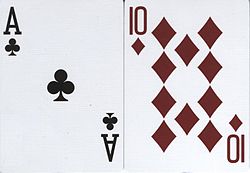Basic strategy

A blackjack
|
|
| Alternative names | Twenty-One |
|---|---|
| Type | Comparing |
| Players | 2+, usually 2–7 |
| Skills required | Probability |
| Cards | 52 to 416 |
| Deck | French |
| Play | Clockwise |
| Random chance | High |
Blackjack, also known as twenty-one, is a comparing card game between usually several players and a dealer, where each player in turn competes against the dealer, but players do not play against each other. It is played with one or more decks of 52 cards, and is the most widely played casino banking game in the world. The objective of the game is to beat the dealer in one of the following ways:
Players are each dealt two cards, face up or down depending on the casino and the table at which you sit. In the U.S., the dealer is also dealt two cards, normally one up (exposed) and one down (hidden). In most other countries, the dealer receives one card face up. The value of cards two through ten is their pip value (2 through 10). Face cards (Jack, Queen, and King) are all worth ten. Aces can be worth one or eleven. A hand's value is the sum of the card values. Players are allowed to draw additional cards to improve their hands. A hand with an ace valued as 11 is called "soft", meaning that the hand will not bust by taking an additional card; the value of the ace will become one to prevent the hand from exceeding 21. Otherwise, the hand is "hard".
Once all the players have completed their hands, it is the dealer’s turn. The dealer hand will not be completed if all players have either busted or received Blackjacks. The dealer must hit until the cards total 17 or more points. (At most tables the dealer also hits on a "soft" 17, i.e. a hand containing an ace and one or more other cards totaling six.) Players win by not busting and having a total higher than the dealer, or not busting and having the dealer bust, or getting a blackjack without the dealer getting a blackjack. If the player and dealer have the same total (not counting blackjacks), this is called a "push", and the player typically does not win or lose money on that hand. Otherwise, the dealer wins.
Blackjack has many rule variations. Since the 1960s, blackjack has been a high-profile target of advantage players, particularly card counters, who track the profile of cards that have been dealt and adapt their wagers and playing strategies accordingly.
Blackjack has inspired other casino games, including Spanish 21 and pontoon.
Blackjack's precursor was twenty-one, a game of unknown origin. The first written reference is found in a book by the Spanish author Miguel de Cervantes, most famous for writing Don Quixote. Cervantes was a gambler, and the main characters of his tale "Rinconete y Cortadillo", from Novelas Ejemplares, are a couple of cheats working in Seville. They are proficient at cheating at veintiuna (Spanish for twenty-one), and state that the object of the game is to reach 21 points without going over and that the ace values 1 or 11. The game is played with the Spanish baraja deck, which lacks eights and nines. This short story was written between 1601 and 1602, implying that ventiuna was played in Castile since the beginning of the 17th century or earlier. Later references to this game are found in France and Spain.
...
Wikipedia
